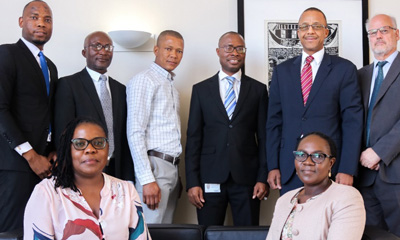
Local diplomats receive digital diplomacy virtual training from Malta

The Deputy Prime Minister and Minister of International Relations and Cooperation, Netumbo Nandi-Ndaitwah, and Evarist Bartolo, Minister of Foreign and European Affairs of the government of Malta, recently officiated a capacity development programme on Digital Diplomacy for Namibian Diplomats offered by the DiploFoundation in partnership with the Maltese government on 7 January.
The 10-day intensive training programme that emanates from the 25th Anniversary of the first joint activity of Malta and Namibia, focused on the importance of digitization for the future of nations around the world, particularly as countries seek to shape their destiny in geopolitics as impacted by technology.
“Namibia has recognised that digitalisation enhances and facilitates the work of diplomats in various sectors, such as health, education, trade and security, in order to develop skills needed to navigate contemporary challenges,” Nandi-Ndaitwah said at the launch.
She stressed that only countries that effectively integrate Information Communication Technology (ICT) in the conduct of diplomacy, will be able to position themselves for the future, adding that digitalization in the conduct of government business will become the norm in so many ways, including diplomacy.
In this regard, she reiterated the need for Namibia to pay special attention to digital training and embrace digital transformation to advance each industry while upholding the United Nations Sustainable Development Goals particularly, Goals Eight, Decent work on Economic Growth and nine on Industry, Innovation, and Infrastructure.
Speaking at the event, Bartolo emphasized that diplomats need to strike balance between updating diplomacy for the 21st century and respecting the traditional values that diplomacy has nurtured for many years.
Referring to a time where the world is struggling with conflict and uncertainty, the minister said: “small states offered a unique insight on how countries can build relations with each other through multilateralism and negotiation.”
The training that consisted of over 80 participants in online sessions, included Namibian Heads of Missions, Home Based staff at Missions, All Management and Staff Members at Headquarters and Ministry of Information Technology and Communication Management and staff members.
The training focused on the following key topics: How countries can advance their interest in digital geopolitics and geoeconomics; negotiation of cybersecurity and e-commerce in multilateral and bilateral settings; how new digital tools such as social media, online conferencing, data, and artificial intelligence can be used in the diplomatic sphere; digital access as a fundamental right; and the place of SDGs in digital diplomacy.
At the end of the programme, Nandi-Ndaitwah expressed Namibia’s gratitude to the Maltese Government for sponsoring the event which greatly enhanced the capacity of the Namibian diplomatic service in the area of digitization. The two Ministers agreed that further cooperation in areas of mutual cooperation would continue to be sought and developed.











































